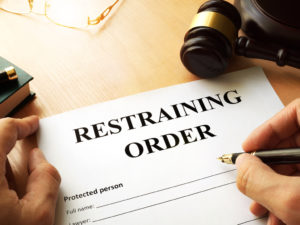
The easiest way to get one is with the help of an attorney who has experience in New Jersey’s family court system. Jersey City domestic violence lawyer Anthony Carbone is dedicated to protecting the rights of the abused. For help in obtaining an order of protection against your abuser, contact the Law Offices of Anthony Carbone now to get the process started.
What Is a Restraining Order?
 Restraining orders is an order of protection put in place by the court to protect a domestic violence victim from his or her alleged abuser. Though domestic violence is a criminal offense, restraining orders are handled by a family court.
Restraining orders is an order of protection put in place by the court to protect a domestic violence victim from his or her alleged abuser. Though domestic violence is a criminal offense, restraining orders are handled by a family court.
According to New Jersey’s Domestic Violence Act, a victim of domestic abuse can get a restraining order if the abuse was committed by a spouse, a household member, a person who he/she is expecting a child with, or someone who he/she is dating. Only an adult can obtain a restraining order.
There are certain criminal offenses that qualify as grounds for obtaining a restraining order:
- Assault or sexual assault
- Terrorist threats
- Kidnapping
- Criminal restraint
- false imprisonment
- Lewdness
- Criminal trespassing
- Harassment
- Stalking
The Different Types of Restraining Order
New Jersey courts issue the following restraining orders in cases of domestic violence:
- Temporary restraining order (TRO): Prohibits contact for up to 10 days
- Emergency order: Similar to a TRO but issued when victims believe they’re in immediate danger and seek intervention from the court outside of normal business hours
- Final restraining order (FRO): After hearing from both parties, the judge will decide whether the terms of the original TRO should be extended, modified, and/or made permanent
These orders generally prohibit the party subject to the complaint from contacting or communicating with the complainant, along with provisions for any required financial support. Terms of a restraining order the judge might set include:
- The distance the defendant must maintain from the complainant

- Places the defendant can’t go because the complainant could likely be there, such as a shared home
- Prohibitions against contacting the complainant in-person, on the phone, or electronically
- An order of financial support the defendant must pay to the complainant
- Child custody, visitation, and support arrangements, if applicable
Violating the provisions of a restraining order can lead to arrest and possible jail time.
To learn more about how our experienced attorney can help protect you from further domestic violence, contact the Law Offices of Anthony Carbone to schedule your free consultation. Attorney Carbone serves clients in Jersey City, Newark, North Bergen, Hoboken, and throughout New Jersey.


